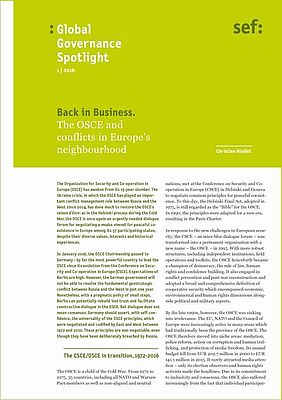
Back in business. The OSCE and conflicts in Europe's neighborhood
Christian Nünlist
March 2016; 4 pages
The Organization for Security and Co-operation in Europe (OSCE) has awoken from its 15-year slumber. The Ukraine crisis, in which the OSCE has played an important conflict management role between Russia and the West since 2014, has done much to restore the OSCE’s raison d’être: as in the Helsinki process during the Cold War, the OSCE is once again an urgently needed dialogue forum for negotiating a modus vivendi for peaceful coexistence in Europe among its 57 participating states, despite their diverse values, interests and historical experiences.
In January 2016, the OSCE Chairmanship passed to Germany – by far the most powerful country to lead the OSCE since its evolution from the Conference on Security and Co-operation in Europe (CSCE). Expectations of Berlin are high. However, the German government will not be able to resolve the fundamental geostrategic conflict between Russia and the West in just one year. Nonetheless, with a pragmatic policy of small steps, Berlin can potentially rebuild lost trust and facilitate constructive dialogue in the OSCE. But dialogue does not mean consensus. Germany should assert, with self-confidence, the universality of the OSCE principles, which were negotiated and codified by East and West between 1972 and 2010. These principles are non-negotiable, even though they have been deliberately breached by Russia.
